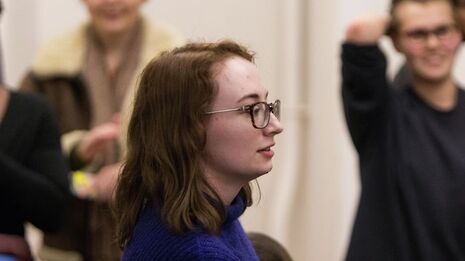Aspinall’s policy choices this year will determine CUSU’s relevance
Analysis: For the incoming CUSU president, being “aware of how much we’re going to get done” is central to outlining her goals for the sabbatical year

The past year has seen several plot lines of student politics, which have defined many finalist campaigners’ three years at Cambridge, come to a close: the introduction of class list opt-outs, the launch of Breaking the Silence, the push for a change to the disciplinary procedure for sexual misconduct – while others, such as divestment from fossil fuels and Cambridge’s stance on Prevent, have reached a stalemate.
Aspinall enters the presidential role next month at a time when student politics has taken on a new relevance: last term’s strike action and this term’s campaign for divestment brought forward structural questions about University democracy, while the current spotlight on drinking society behaviour has mobilised a section of the student body previously disengaged.
“This has come at the perfect time,” Aspinall says, remarking on the newfound attention directed towards drinking societies.
At the start of the new CUSU team’s tenure, the team’s selection of which key issues they will tackle will not define the narrative of student politics itself, but the centrality and prominence of CUSU within the broader stage of student activism.
In choosing her focus, Aspinall – alongside the rest of her team – decides whether this new mobilisation will translate into fulfilling one of her key campaign promises: student engagement. How effectively CUSU is able to harness this newfound political energy will define its prominence in the year to come.
She notes that she sees change as originating both within and outside of Cambridge’s formal institutions, stating that “divestment would never happen just with the occupation of buildings – it would also never just happen with going to the University Council”. Aspinall views different members of her sabbatical team as potentially providing “different faces” in addressing the same choices, while noting her background in working within institutional structures.
She tells me that she views the divestment debate as seeing “a block” from the University, following the Council’s landmark decision against full divestment earlier this month. Her argument that CUSU might indirectly address divestment through broader campaigns – “the University’s accountability to students”, for example – is overly optimistic, however, given the Council’s apparent disengagement with students’ concerns in the face of its own financial risk.
One topic of conversation which emerged during the 2018 CUSU campaign season was whether CUSU is ignoring the ‘average’ Cambridge student – Aspinall’s campaign very effectively tapped into this concern. Indicative of her desire to address this is her defining the crucial policy issue of her tenure – aside from student engagement – as college inequality.
In determining her plan of action, however, Aspinall will be forced to grapple with how to most effectively capitalise on the political mobilisation seen this term, and how she will reconcile her personal preference for an institutional approach when facing issues seemingly stonewalled by University bureaucracy or by the collegiate system’s decentralisation.
 News / Judge Business School advisor resigns over Epstein and Andrew links18 February 2026
News / Judge Business School advisor resigns over Epstein and Andrew links18 February 2026 News / Gov grants £36m to Cambridge supercomputer17 February 2026
News / Gov grants £36m to Cambridge supercomputer17 February 2026 News / Hundreds of Cambridge academics demand vote on fate of vet course20 February 2026
News / Hundreds of Cambridge academics demand vote on fate of vet course20 February 2026 News / CUCA members attend Reform rally in London20 February 2026
News / CUCA members attend Reform rally in London20 February 2026 News / Union speakers condemn ‘hateful’ Katie Hopkins speech14 February 2026
News / Union speakers condemn ‘hateful’ Katie Hopkins speech14 February 2026











